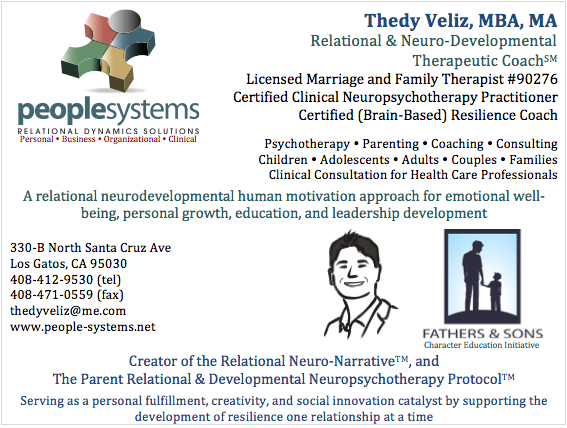Working with Fathers and Sons
I have taken a special interest in helping male youth and their fathers develop a better relationship. It has been my experience that in many cases the day-to-day active parenting is usually carried out by the mother, yet boys need a significant male role model to help them learn how to become a responsible man. While some mothers have learned to quite successfully play the role of both mother and father, it is more challenging for a mother to show her son how to become a man especially as the boy starts to become an adolescent.

In working with boys and their fathers, I use what I have learned to call ‘male psychology.’ While at a cognitive level boys might feel loved by their father, boys might not feel unconditionally accepted and understood at an emotional level. It has been my experience that underneath destructive behavior in adolescent boys there is usually a breached relationship with the father. While fathers might be aware of this, in many cases they don’t know what to do. Fathers tell me that they talk and interact with their sons, yet sometimes talking and interacting is not enough as the use of language is a cognitive activity, which might not reach the internal world of the developing male.

In many cases, the challenge is intergenerational and runs deep. In commenting about how I conceptualize the challenging dynamic between a troubled boy and his father, the counseling coordinator at Leigh High School where I did part of my clinical practicum wrote that “Thedy believes that if you see a troubled teenage boy, look back one generation and you’ll find a troubled man. Both need services and both will heal together. He facilitates that healing and the results can be magical.”
My therapeutic approach with fathers and sons has been influenced by the work of Jerry Shapiro, PhD, a professor of counseling psychology at Santa Clara University (Shapiro, 1993); William Pollack, PhD, Director of the Centers for Men and Young Men at McLean Hospital and Assistant Clinical Professor at Harvard Medical School (Pollack, 1998); and Leonard Sax, MD, PhD, a family physician and psychologist who writes about how gender differences and traditional educational practices affect the development of boys (Sax, 2005, 2007).
References
- Pollack, W. (1998). Real boys: Rescuing our sons from the myths of boyhood. New York, NY: Owl Books.
- Sax, L. (2007). Boys adrift: The five factors driving the growing epidemic of unmotivated boys and underachieving young men. New York, NY: Basic Books.
- Sax, L. (2005). Why Gender Matters: What Parents and Teachers Need to Know about the Emerging Science of Sex Differences. New York, NY: Broadway Books.
- Shapiro, J. L. (1993). The measure of a man: Becoming the father you wish your father had been. New York, NY: Delacorte Press.
